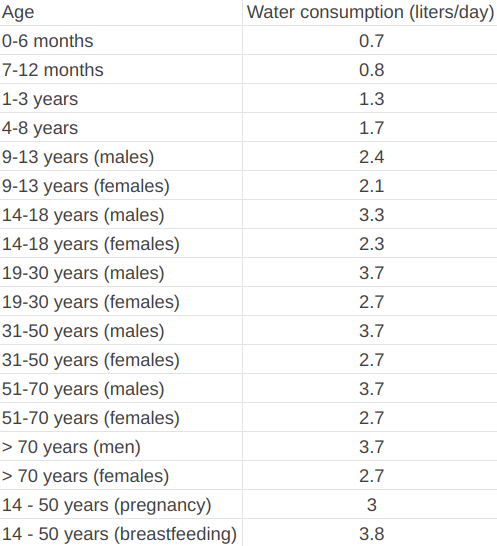The benefits of the recommended consumption of water
Find out why it is important to maintain adequate water consumption to meet the recommendations and maintain optimal hydration status daily.

Do you like a glass of water or a soft drink? In general, the answer regarding water consumption is not always the right one, especially by children, and on frequent occasions by adults. It is well known that there is an innate preference for sweet things, and if we add to those containers with bright colors, fresh and with a cold temperature, it becomes even more attractive, or not?
Unfortunately, Mexico has the first place as a consumer of sugary drinks in the world, with 163 liters of soft drinks per capita per year. Water is life and yet it has been displaced by sugary drinks. This does not help the integral health that is required, since water plays an extremely important role in human beings at any age.
Two studies point out the deficient consumption of water in the Latin American population, in contrast to that of sugar-sweetened beverages, which are among the highest in the world. Martinez and collaborators, 2018, evaluated water consumption in 3,797 adults from Mexico, Argentina, Brazil, and Uruguay.
Approximately, one-third did not consume the amount of water recommended by the U.S. Institute of Medicine, which is 6 to 8 glasses per day. In contrast, they had a high consumption of sugar-sweetened beverages, especially Mexicans, with more than half a liter daily (531 mL/day). This consumption was higher than that of Brazil (409 mL/day), Argentina (338 mL/day), and more than double that of Uruguay (215 mL/day).
Water Consumption and Results of the National Health and Nutrition Survey
Meanwhile, Gandy et al. published in 2018 estimated water consumption in 1,666 children and adolescents aged 4 to 17 years from these four countries. More than 75% of children in Uruguay met the recommendation, followed by those in Argentina (64-72%), Brazil (41-50%), and, with the lowest percentage, Mexico (33-44%).
Adolescents in the four countries complied less with the water recommendation than children. Their compliance percentages were 28% in Mexico, 37% in Uruguay, 38% in Brazil, and 42% in Argentina. In addition, children and adolescents in Mexico and Argentina consumed more sugar-sweetened beverages than water, even though a healthy diet does not require sugary liquids to meet energy and nutrient needs.
In 2018, the Ministry of Health, together with the National Institute of Public Health and the National Institute of Statistics and Geography, presented the population-based results of the National Health and Nutrition Survey, where they pointed out that 83.3% of children aged 1-4 years consume sweetened non-dairy beverages and this percentage increases to 85.7% with age.
It is worrisome that from an early age, parents include beverages with a high content of added sugars in their children's diet, when water can satisfy the liquid needs of healthy individuals, without representing a risk of developing caries and chronic diseases, such as those associated with the consumption of sugar-sweetened beverages. On the other hand, although 88.6% of children aged 1 to 4 years consume water, this percentage does not increase with age and in the group aged 12 to 19 years, it even decreases to 79.3%.
How many glasses of water did you drink today?
It is important to maintain adequate water consumption to meet the recommendations and maintain optimal hydration status. This, without considering other situations of illness or dehydration, is which specific attention directed by a health professional is required.
The benefits of the recommended consumption of water -which is around 2 liters- in people of any age, are reflected in their mood, physical and cognitive performance, body temperature, and excretion of waste from the body through urine (even in those who are overweight or obese) when they replace sugary drinks with plain water.
It is up to each of us to do our part and encourage our families to increase the consumption of natural water. Instead of consuming commercial beverages with lots of added sugar, we can prepare seasonal fruit water, which could be orangeade, watermelon water, or melon water, all of which are rich in vitamins and antioxidants that hydrate us and are healthy.
Water consumption recommendation by the U.S. Institute of Medicine

Source: Collaboration of Ma. Socorro Saucedo Tamayo and Adriana V. Bolaños Villar, researchers of the Nutrition Coordination of CIAD, and María José Mendívil Armenta, student of the propaedeutic stay.




